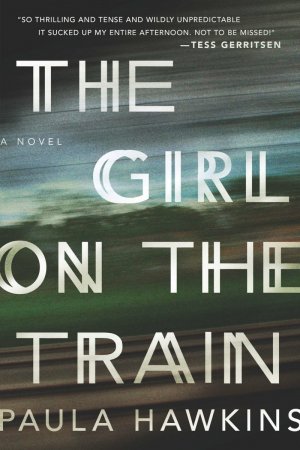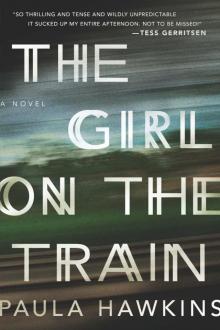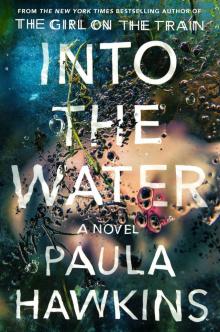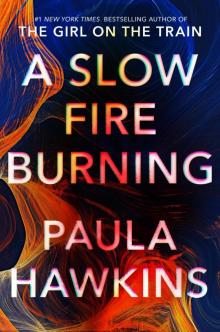- Home
- Paula Hawkins
Into the Water Page 23
Into the Water Read online
Page 23
“I don’t think anyone would expect you to,” I said softly. “Not—”
“Not yet? Which implies that at some point I won’t feel like this. But the thing people don’t seem to realize is that I don’t want to not feel like this. How can I not feel like this? My sadness feels right. It . . . weighs the right amount, crushes me just enough. My anger is clean, it bolsters me. Well . . .” She sighed. “Only now my son thinks I’m responsible for Lena going missing. Sometimes I wonder if he thinks I pushed Nel Abbott off that cliff.” She sniffed. “In any case, he holds me responsible for the fact that Lena was left like that. Motherless. Alone.”
I stood in the middle of the room, my arms carefully folded, trying not to touch anything. Like I was at a crime scene, like I didn’t want to contaminate anything.
“She’s motherless,” I said, “but is she fatherless? Do you honestly believe that Lena has no idea who her father is? Do you know if she and Katie ever spoke about that?”
Louise shook her head. “I’m pretty sure she doesn’t know. That was what Nel always said. I thought it was odd. Like a lot of Nel’s parenting choices, not just odd but irresponsible—I mean, what if there was a genetic issue, an illness, something like that? It seemed unfair on Lena in any case, not to even give the child the option of getting to know her father. When pressed—and I did press her, back when she and I were on better terms—she said it was a one-night stand, someone she met when she first moved to New York. She claimed not to have known his last name. When I thought about that later on, I concluded it must have been a lie, because I’d seen a photograph of Nel moving into her first flat in Brooklyn, her T-shirt stretched tight over her already pregnant belly.”
Louise stopped stacking books. She shook her head again. “So, in that sense, Josh is right. She is alone. There’s no other family apart from the aunt. Or none that I ever heard of. And as for boyfriends . . .” She gave a rueful smile. “Nel once told me that she only ever slept with married men, because they were discreet and undemanding and they let her get on with her life. Her affairs were private. I’ve no doubt there were men, but she didn’t make that sort of thing public. Whenever you saw her, she was alone. Alone or with her daughter.” She gave a little sigh. “The only man I think I’ve ever seen Lena be even vaguely affectionate to is Sean.” She coloured slightly as she said his name, turning her head away from me, as though she’d said something she shouldn’t have.
“Sean Townsend? Really?” She didn’t reply. “Louise?” She got to her feet to fetch another pile of books from the shelf. “Louise, what are you saying? That there’s something . . . untoward between Sean and Lena?”
“God, no!” She gave a brittle laugh. “Not Lena.”
“Not Lena? So . . . Nel? Are you saying there was something between him and Nel Abbott?”
Louise pursed her lips and turned her face from mine so I couldn’t read her expression.
“Because, you know, that would be highly inappropriate. To investigate the suspicious death of someone with whom he’d had a relationship, that would be . . .”
What would that be? Unprofessional, unethical, grounds for dismissal? He wouldn’t. There is no way he could have done that, no way he could have kept that from me. I would have seen something, noticed something, wouldn’t I? And then I thought of how he looked the first time I saw him, stood there on the banks of the pool with Nel Abbott at his feet, head bowed as though he was praying over her. His watery eyes, his shaking hands, his absent manner, his sadness. But that was about his mother, surely?
Louise continued silently packing books into boxes.
“Listen to me,” I said, raising my voice to get her full attention. “If you are aware that there was some sort of relationship between Sean and Nel, then—”
“I didn’t say that,” she said, looking me dead in the eye. “I didn’t say anything of the sort. Sean Townsend is a good man.” She got to her feet. “Now, I have a lot to do, Detective. I think it’s probably time you left.”
SEAN
The back door had been left open, the Scenes of Crime officers said. Not just unlocked, but open. The tang of iron caught in my nostrils as I entered. Callie Buchan was already there, talking to the SOCOs; she asked me a question, but I wasn’t really listening because I was straining to hear something else—an animal, whimpering.
“Shhh,” I said. “Listen.”
“They’ve checked the house, sir,” Callie said. “There’s no one here.”
“Does he have a dog?” I asked her. She looked at me blankly. “Is there a dog, a pet in the house? Any sign of one?”
“Nope, no sign at all, sir. Why do you ask?”
I listened again, but the sound was gone and I was left with a sense of déjà vu: I’ve seen this before, I’ve done all this before—I’ve listened to a dog whimper, I’ve walked through a bloody kitchen into the rain.
Only it isn’t raining, and there’s no dog.
Callie was staring at me. “Sir? There’s something over here.” She pointed at an item on the floor, a pair of kitchen scissors lying in a smear of blood. “That’s not just a nick, is it? I mean, it might not be arterial, but it doesn’t look good.”
“Hospitals?”
“Nothing so far, no sign of either of them.” Her phone rang and she went outside to take the call.
I remained stock-still in the kitchen while two Scenes of Crime officers worked quietly around me. I watched one of them pluck with tweezers a strand of long blond hair that had snagged on the edge of the table. I felt a sudden wave of nausea, saliva flooding my mouth. I couldn’t credit it: I’ve seen worse scenes than this—far worse—and remained impassive. Haven’t I? Have I not walked through bloodier kitchens than this?
I touched my palm to my wrist and realized that Callie was speaking to me again, her head poked around the doorframe. “Can I have a word, sir?” I followed her outside, and while I removed the plastic covers from my shoes, she filled me in on the latest. “Traffic have picked up Henderson’s car,” she said. “I mean, not picked up, but they’ve got his red Vauxhall on camera twice.” She looked down at her notebook. “Thing is, it’s a bit confusing because the first capture, just after three this morning, has him on the A68 going north towards Edinburgh, but then a couple of hours later, at five fifteen, he’s driving south on the A1 just outside Eyemouth. So maybe he . . . dropped something off?” Got rid of something, she means. Something or someone. “Or he’s trying to confuse us?”
“Or he changed his mind about the best place to run to,” I said. “Or he’s panicking.”
She nodded. “Running around like a headless chicken.”
I didn’t like that idea, I didn’t want him—or anyone else—headless. I wanted him calm. “Was it possible to see if there was anyone else in the car, anyone in the passenger seat?” I asked her.
She shook her head, lips pursed. “No. Of course . . .” she tailed off. Of course, that doesn’t mean there isn’t another person in the car. It just means that the other person isn’t upright.
Again, that odd sense of having been here before, a scrap of memory that didn’t feel like my own. How could it be anyone else’s? It must have been part of a story, told to me by someone I don’t remember. A woman lying slumped in a car seat, a sick woman, convulsing, drooling. Not much of a story—I couldn’t remember the rest of it, I only knew that thinking about it turned my stomach. I pushed it aside.
“Newcastle would seem the obvious place,” Callie said. “I mean, if he’s running. Planes, trains, ferries—world’s his oyster. But the odd thing is that since that five a.m. sighting, they’ve got nothing, so either he’s stopped or he’s got off the main road. He might be taking smaller roads, the coastal road even—”
“Isn’t there a girlfriend?” I asked, interrupting her flow. “A woman in Edinburgh?”
“The famous fiancée,” Callie said, eyebrows raised.
“Well, way ahead of you there. She—Tracey McBride, her name is—was picked up this morning. Uniform are bringing her down to Beckford for a chat. But, just to warn you, our Tracey claims she hasn’t seen Mark Henderson for a good while. Almost a year, in fact.”
“What? I thought they’d just been on holiday together?”
“That’s what Henderson said when he spoke to DS Morgan, but according to Tracey, she’s not seen hide nor hair of him since he called the whole thing off last autumn. She says he dumped her out of the blue, telling her he’d fallen head over heels for some other woman.”
• • •
TRACEY DIDN’T KNOW who the woman was or what she did. “Nor did I want to,” she told me abruptly. She was sitting in the back office of the police station, an hour later, sipping her tea. “I was . . . I was pretty devastated, actually. One minute I’m shopping for wedding dresses and the next he’s telling me he can’t go through with it ’cos he’s met the love of his life.” She smiled at me sadly, pushing her fingers through cropped dark hair. “After that, I just cut him off. Deleted his number, unfriended him, the full monty. Could you please tell me, has something happened to him? No one will tell me what the hell’s going on.”
I shook my head. “I’m sorry about that, but there’s not a lot I can tell you at the moment. We don’t believe he’s been harmed, though. We just need to find him, we need to talk to him about something. You don’t know where he might go, do you? If he needed to get away? Parents, friends in the area?”
She frowned. “This is not about that dead woman, is it? I read in the papers that there was another one a week or two back. I mean . . . he wasn’t . . . that wasn’t the woman he was seeing, was it?”
“No, no. It’s nothing to do with that.”
“Oh, OK.” She looked relieved. “I mean, she would have been a bit old for him, wouldn’t she?”
“Why do you say that? Did he like younger women?”
Tracey looked confused. “No, I mean . . . how do you mean, younger? That woman was, like, about forty, wasn’t she? Mark’s not yet thirty, so . . .”
“Right.”
“You really can’t tell me what’s going on?” she asked.
“Was Mark ever violent to you, did he ever lose his temper, anything like that?”
“What? God, no. Never.” She leaned back in her chair, frowning. “Has someone accused him of something? Because he’s not like that. He’s selfish, no doubt about that, but he’s not a bad person, not in that way.”
I walked her out to the car, where uniform were waiting to drive her home, wondering about the ways in which Mark Henderson was bad, wondering whether he’d managed to convince himself that being in love absolved him.
“You asked about where he might go,” Tracey said to me when we got to the car. “It’s difficult to say, without knowing the context, but there’s one place I can think of. We—well, my dad—has a place out on the coast. Mark and I went there at weekends quite a bit. It’s quite isolated, there’s no one else around. Mark always said it was the perfect escape.”
“It’s unoccupied, this place?”
“It’s not used much. We used to leave a key out the back under a pot, but earlier this year we discovered that someone had been using it without our permission—there would be mugs left out or rubbish in the bins or whatever—so we stopped doing that.”
“When was the last time that happened? The last time someone used it without asking?”
She frowned. “Oh, God. A while back. April, I think? Yeah, April. The Easter holidays.”
“And where exactly is this place?”
“Howick,” she said. “It’s a tiny little village, nothing much there at all. Just up the coast from Craster.”
LENA
He apologized when he let me out of the boot. “I’m sorry, Lena, but what would you have had me do?” I started laughing, but he told me to shut up, his fist clenched, and I thought he was going to smack me again, so I did.
We were at a house by the sea—just one house, all by itself, right on the cliff, with a garden and a wall and one of those outdoor pub tables. The house looked like it was all locked up, there was no one around. From where I was standing I couldn’t see another building anywhere near us, just a track running past, not even a proper road. I couldn’t hear anything either—no traffic noise, nothing like that, just the gulls and the waves on the rocks.
“No point screaming,” he said, like he’d read my mind. Then he took me by the arm and led me over to the table, and handed me a tissue to wipe my mouth.
“You’ll be all right,” he said.
“Will I?” I asked, but he just looked away.
For a long time, we just sat there side by side, with his hand still on my forearm, his grip gradually loosening as his breathing slowed. I didn’t pull away. No point struggling now. Not yet. I was scared, my legs were trembling like mad under the table and I couldn’t make them stop. But it actually felt like that was good, like it was helpful. I felt strong, the way I had when he found me in the house and we fought. Yeah, OK, he won, but only because I didn’t go for the kill straightaway, only because I wasn’t sure what I was dealing with. That was only the first round. If he thought that was me beaten, he had another thing coming.
If he knew what I’d been feeling, what I’d been through, I don’t think he’d be holding on to my arm. I think he’d been running for his fucking life.
I bit down hard on my lip. I could taste fresh blood on my tongue and I liked it, it felt good. I liked the metal taste, I liked the feel of blood in my mouth, something to spit at him. When the time was right. I had so many things to ask him, but I didn’t know where to start, so I just said, “Why did you keep it?” I had to try really hard to keep my voice steady and not let it crack or shake or waver or show him that I was scared. He didn’t say anything, so I asked again. “Why did you keep her bracelet? Why not just throw it away? Or leave it on her wrist? Why take it?”
He let go of my arm. He didn’t look at me, just stared out at the sea. “I don’t know,” he said wearily. “Honestly, I’ve no idea why I took it. Insurance, I suppose. Clutching at straws. To hold something over someone else . . .” He stopped speaking suddenly and closed his eyes. I didn’t understand what he was talking about, but I had a feeling, like I’d opened something up, an opportunity. I moved very slightly away from him. Then slightly more. He opened his eyes again, but did nothing, just kept staring at the water, his face expressionless. He looked exhausted. Beaten. Like he had nothing left. I drew back on the bench. I could run. I’m really fast when I need to be. I glanced back at the track behind the house. I’d have a good chance of getting away from him if I headed straight across the track, over the stone wall and across the fields. If I did that, he wouldn’t be able to follow in the car, and I’d have a chance.
I didn’t do it. Even though I knew it might be the last chance I’d get, I stayed put. If it came down to it, I thought, it would be better to die knowing what happened to my mother than to live and always wonder, to never ever know. I didn’t think I could bear that.
I got to my feet. He didn’t move, just watched me as I rounded the table and sat down opposite him, forcing him to look at me.
“Do you know that I thought she’d left me? Mum. When they found her and they came and told me, I thought it was a choice. I thought she chose to die, because she felt guilty about what happened to Katie or because she was ashamed of that, or . . . I don’t know. Just because the water had a stronger pull for her than I did.”
He said nothing.
“I believed that!” I shouted it as loud as I could and he jumped. “I believed that she abandoned me! Do you understand what that felt like? And now it turns out she didn’t. She didn’t choose anything. You took her. You took her from me, just like you took Katie.”
He smiled at me. I remembered how we used to think he was han
dsome, and it turned my stomach. “I didn’t take Katie from you,” he said. “Katie wasn’t yours, Lena. She was mine.”
I wanted to scream at him, to scratch his face. She wasn’t yours! She wasn’t! She wasn’t! I dug my nails into my hands as hard as I could, I bit my lip and tasted the blood again, and listened to him justifying himself.
“I never thought of myself as the sort of person who would fall for a girl. Never. I thought people like that were ridiculous. Sad old losers who couldn’t get a woman their own age.”
I laughed. “Exactly,” I said. “You thought right.”
“No, no.” He shook his head. “That’s not true. It isn’t. Look at me. I’ve never had any trouble getting women. They come on to me all the time. You shake your head now, but you’ve seen it. Christ, you did it yourself.”
“I did fucking not.”
“Lena—”
“Do you honestly think I wanted you? You’re deluded. It was a game, it was—” I stopped talking. How do you even explain something like that to a man like him? How do you explain that it was nothing to do with him and everything to do with you? That—for me, in any case—it was about me and Katie and the things we could do together. The people we did them to were interchangeable. They didn’t matter at all.
“Do you know what it’s like when you look the way I do?” I asked him. “I mean, I know you think you’re hot or whatever, but you have no idea what it’s like to be like me. Do you know how easy it is for me to make people do what I want, to make them uncomfortable? All I have to do is look at them a certain way, or stand near them, or stick my fingers in my mouth and suck and I can see them go red or hard or whatever. That’s what I was doing to you, you retard. I was taking the piss out of you. I didn’t want you.”
He scoffed, gave this unconvinced little laugh. “Right, OK,” he said. “If you say so, Lena. So what did you want? When you threatened to betray us, when you went shouting your mouth off so your mother could hear—what did you want?”

 Girl on the Train
Girl on the Train The Girl on the Train
The Girl on the Train Into the Water
Into the Water A Slow Fire Burning
A Slow Fire Burning